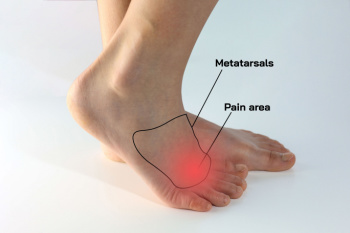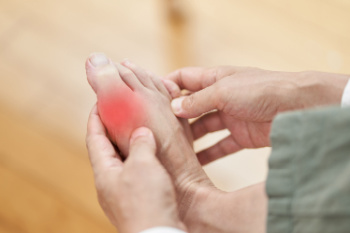
Morton's neuroma is a painful condition affecting the nerves in the ball of the foot, most commonly between the third and fourth toes. This condition is characterized by a thickening of the tissue surrounding a nerve, leading to compression and irritation. Morton's neuroma is often associated with stress or trauma to the foot, such as wearing tight or ill-fitting shoes, high heels, or participating in activities that involve repetitive impact on the forefoot. Additionally, foot deformities like bunions, hammertoes, or high arches can contribute to the development of Morton's neuroma by placing increased pressure on the nerves. Certain factors like foot structure, gait abnormalities, and genetic predisposition may also play a role. Individuals with Morton's neuroma typically experience symptoms such as sharp or burning pain in the ball of the foot, tingling or numbness, and a sensation of having a pebble in the shoe. It is beneficial to recognize the early symptoms of Morton’s neuroma which may help to increase the possibility of prompt relief. If you have pain in this part of your foot, it is suggested that you visit a podiatrist who can provide you with expert medical advice.
Morton’s neuroma is a very uncomfortable condition to live with. If you think you have Morton’s neuroma, contact Dr. Lubrina Bryant of District Podiatry, PLLC. Our doctor will attend to all of your foot care needs and answer any of your related questions.
Morton’s Neuroma
Morton's neuroma is a painful foot condition that commonly affects the areas between the second and third or third and fourth toe, although other areas of the foot are also susceptible. Morton’s neuroma is caused by an inflamed nerve in the foot that is being squeezed and aggravated by surrounding bones.
What Increases the Chances of Having Morton’s Neuroma?
Morton’s neuroma is a very treatable condition. Orthotics and shoe inserts can often be used to alleviate the pain on the forefront of the feet. In more severe cases, corticosteroids can also be prescribed. In order to figure out the best treatment for your neuroma, it’s recommended to seek the care of a podiatrist who can diagnose your condition and provide different treatment options.
If you have any questions, please feel free to contact our office located in Washington, D.C . We offer the newest diagnostic and treatment technologies for all your foot care needs.

Gout, a form of inflammatory arthritis that often affects the big toe, can be triggered by certain foods high in purines, compounds that break down into uric acid. Uric acid buildup can lead to the formation of painful urate crystals in the joints, commonly affecting the big toe. To manage gout effectively, it is essential to be mindful of foods that can exacerbate symptoms. These can include foods rich in purines such as red meat, organ meats like liver and kidneys, shellfish, anchovies, and sardines. Additionally, high-fructose corn syrup found in sweetened beverages and foods can increase uric acid levels, as can alcohol consumption, particularly beer and spirits. Processed foods, refined carbohydrates, and sugary snacks should also be limited. Instead, focus on a balanced diet rich in fruits, vegetables, whole grains, and lean proteins. By avoiding or moderating the consumption of gout-triggering foods and prioritizing a healthy lifestyle, individuals can better manage their condition and reduce the frequency and severity of gout attacks. If you have had one or more gout attacks, it is strongly suggested that you are under the care of a podiatrist who can help you manage this condition, which often includes effective preventative methods.
Gout is a foot condition that requires certain treatment and care. If you are seeking treatment, contact Dr. Lubrina Bryant from District Podiatry, PLLC. Our doctor will treat your foot and ankle needs.
What Is Gout?
Gout is a type of arthritis caused by a buildup of uric acid in the bloodstream. It often develops in the foot, especially the big toe area, although it can manifest in other parts of the body as well. Gout can make walking and standing very painful and is especially common in diabetics and the obese.
People typically get gout because of a poor diet. Genetic predisposition is also a factor. The children of parents who have had gout frequently have a chance of developing it themselves.
Gout can easily be identified by redness and inflammation of the big toe and the surrounding areas of the foot. Other symptoms include extreme fatigue, joint pain, and running high fevers. Sometimes corticosteroid drugs can be prescribed to treat gout, but the best way to combat this disease is to get more exercise and eat a better diet.
If you have any questions please feel free to contact our office located in Washington, D.C . We offer the newest diagnostic and treatment technologies for all your foot and ankle needs.

Obesity casts a profound shadow over foot health, influencing various aspects of function and well-being. Excessive body weight places immense pressure on the feet, exacerbating biomechanical stress and strain. The increased load on weight-bearing structures, such as joints, ligaments, and tendons, can lead to structural changes, including flattening of the arches and misalignment of the foot bones. Consequently, individuals with obesity are more susceptible to foot ailments such as plantar fasciitis, osteoarthritis, and stress fractures. Moreover, the excess fat tissue surrounding the feet may impede circulation and impair healing processes, predisposing to conditions like peripheral artery disease and delayed wound healing. Mobility and balance may also be compromised, increasing the risk of falls and injuries. Addressing obesity through lifestyle modifications, including dietary changes and regular exercise, is essential not only for overall health but also for managing the adverse effects on foot health. If you are overweight and have developed foot pain, it is suggested that you contact a podiatrist who can help you with relief and management tips.
Obesity has become very problematic at this point in time and can have extremely negative effects on the feet. If you’re an obese individual and are concerned about your feet, contact Dr. Lubrina Bryant from District Podiatry, PLLC. Our doctor can provide the care you need to keep you pain-free and on your feet.
Obesity and Your Feet
Since your feet are what support your entire weight when standing, any additional weight can result in pain and swelling. Being overweight is one of the main contributors to foot complications.
Problems & Complications
Extra Weight – Even putting on just a few extra pounds could create serious complications for your feet. As your weight increases, your balance and body will shift, creating new stresses on your feet. This uneven weight distribution can cause pain, even while doing the simplest tasks, such as walking.
Diabetes – People who are overweight are at serious risk of developing type-2 diabetes, which has a drastic impact on the health of your feet. As you get older, your diabetes might worsen, which could lead to loss of feeling in your feet, sores, and bruises. You could also become more prone to various infections.
Plantar fasciitis – Pressure and stress that is placed on muscles, joints, and tendons can trigger plantar fasciitis, which is an inflammation of tissue that forms along the bottom of the foot.
If you have any questions please feel free to contact our office located in Washington, D.C . We offer the newest diagnostic and treatment technologies for all your foot and ankle needs.